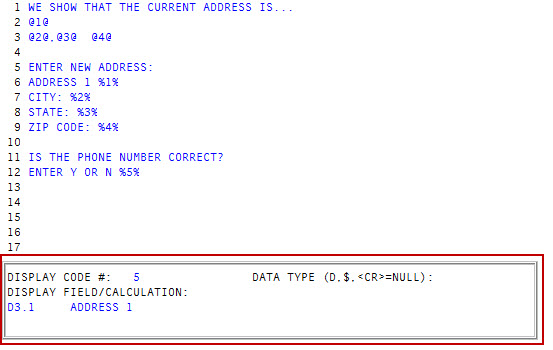Creating or changing @codes in collector telephone scripts
There may be places in the script where you want to display information from the database. To do this, use @codes to pull the information you need from the database.
When you begin typing the @code, the following window displays at the bottom of the screen.

The following fields serve these purposes:
|
Field |
Description |
|
Display Code # |
Display codes are numbered sequentially within a script. This allows you to use a display code more than once throughout a script. For example, if you will access the address information for an account multiple times, you only need to reference the display code number instead of having to set up the @code each time to insert the account address information. When the screen first displays, the next sequential display code displays in this field. |
|
Data Type |
The data type is used in the formatting of data as it displays. |
|
Display Field/Calculation |
This field displays the source of the data to be displayed. This allows you to display information directly from the database, or you can enter a mathematical formula that calculates data from the database to display in this field. |
To create or change @codes in a collector telephone script:
- Create or open the script according to Creating or changing telephone scripts, and when typing the text for the script, do one of the following:
- To add an @code, type @ where the data should display.
- To change an @code, type G and the line number where the current @code displays in the script. In the line, type @ to edit the display code.
-
In the Display Code # field, do one of the following:
- To accept the next sequential code number, press Enter.
- To use a display code that has already been set up in this script, type the number, and press Enter.

-
In the Data Type (D, $, <CR>=Null) field, do one of the following to format the data as it displays, and press Enter:
- To display information as a date, type D.
- To display information as a dollar amount, type $.
- To display all other data types as-is, leave the field blank.

-
In the
 Display Field/Calculation field, access any of the following:
Display Field/Calculation field, access any of the following: Debtor file data
Debtor file data
D and the attribute number, and press Enter
 Client file data
Client file data
C and the attribute number, and press Enter
 Agency file data
Agency file data
A and the attribute number, and press Enter
 Fiscal file data
Fiscal file data
F and the attribute number, and press Enter
 A list of all the valid display fields
A list of all the valid display fields
?, and press Enter
 Collector's pseudonym
Collector's pseudonym
S1, and press Enter
 Data entered in the previous script
Data entered in the previous script
PSnn (nn is the number of the input codes used in the previous script), and press Enter
 Data entered in the current script
Data entered in the current script
CSnn (nn is the number of the input code used in the current script), and press Enter
 The account's balance, include packets, interest, and judgments
The account's balance, include packets, interest, and judgments
BAL, and press Enter
-
To perform calculations in the Display Field/Calculation field, type = and a combination of literals, amount fields from the database, or amounts previously entered in the script, and press Enter.
When you use fields from the database, use the formats as shown in step 4, and ensure that you only use numeric fields. Calculations are performed in the order you enter them. You cannot group calculations by parenthesis to order them.
The following table includes some examples of calculations you can perform in this field:
Formula
Description
=BAL/12
One twelfth of the balance
=D15-D16
Subtract the amount in Debtor file attribute 16 from the amount in Debtor file attribute 15
=D15-D16/12
Subtract the amount in Debtor file attribute 16 from the amount in Debtor file attribute 15 and divide the result by 12
- At the OK to File? (Y, N, /) prompt, do one of the following, and press Enter:
- To save your changes and return to the script, type Y.
- To discard your changes and return to the script, type N.
- To make changes to the display code, type /.
- To continue changing or creating the script, return to Creating or changing telephone scripts.
